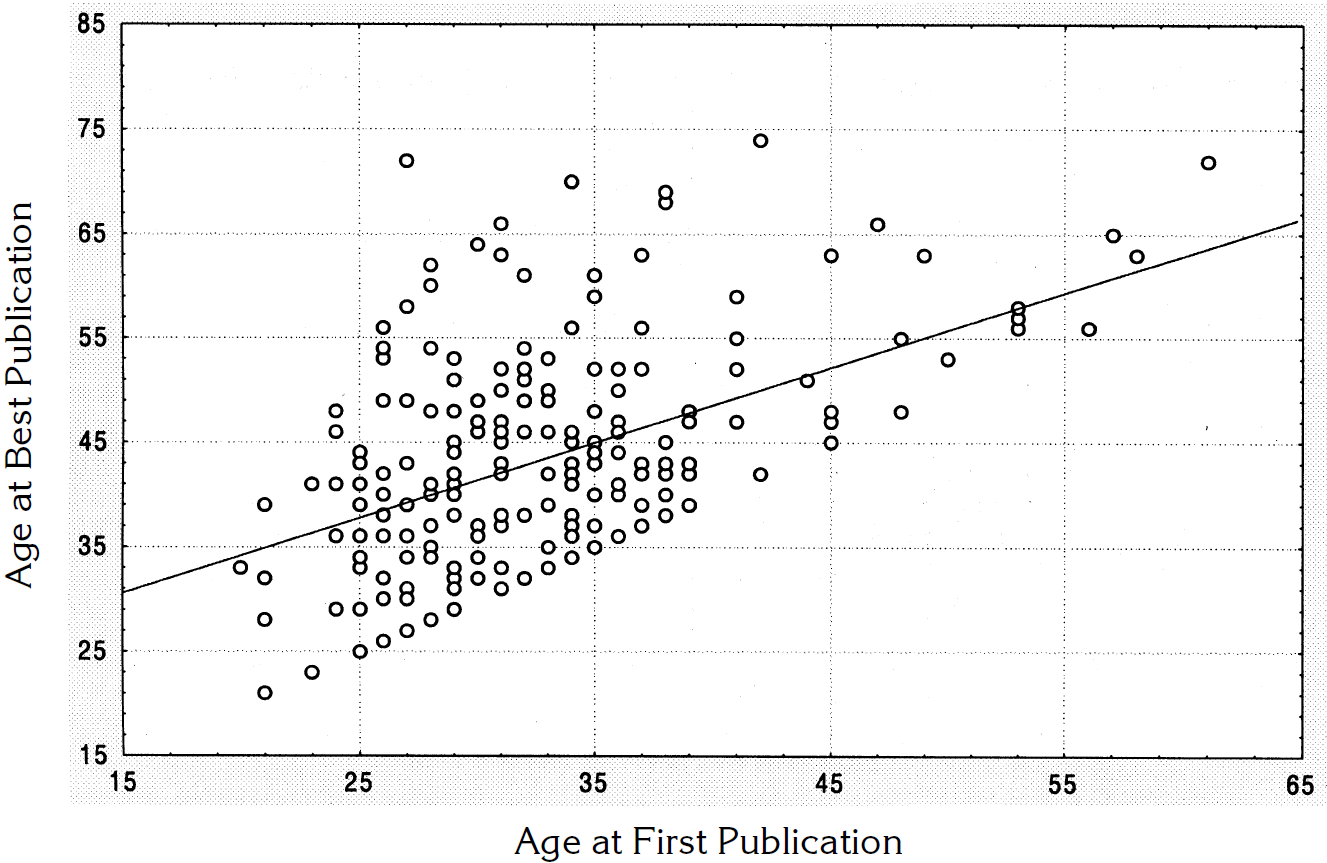
Age at peak skill vs. age at initial expertise for writers. Expert-to-peak averaged 11-13 years, and took up to 45 years.[1]
English-language expertise starts with years to proficiency
… even in two California districts that are considered the most successful in teaching English to limited-English-proficient students, oral proficiency takes 3 to 5 years to develop, and academic English proficiency can take 4 to 7 years.
This paper follows on precedent-setting research… estimates of up to 10 years before students are fully proficient in English, i.e., are fully competitive in the academic uses of English with their age-equivalent, native English-speaking peers.[2]
English-language expertise is not necessarily automatic
…the ‘compressed’ discourse style of academic writing is much less explicit in meaning than alternative styles employing elaborated structures. These styles are efficient for expert readers, who can quickly extract large amounts of information from relatively short, condensed texts. However, they pose difficulties for novice readers, who must learn to infer unspecified meaning relations among grammatical constituents.[3]
This article presents a case study of a nonnative-English-speaking scholar from Hong Kong and his experience in publishing a scholarly article in an international refereed journal on his return from doctoral study in the United States.
…Oliver had considerable exposure to English throughout his life. His first contact with the language was at kindergarten, when he was 3–4 years old. Following kindergarten, he went to an English-medium elementary school. After that he moved to an English-medium secondary school that was staffed primarily by Irish Jesuit priests. His undergraduate education was at a Hong Kong university that has a bilingual policy of teaching in Chinese or English. On graduation, he worked for a time. Later, for his MA and PhD, he moved to a major research university in the United States, where he had very little contact with non-English speakers either inside the university or outside, where he had friends in the local community, living for 2 years with an American family. Oliver said that he considered both Chinese and English as his mother tongue.
Oliver was lucky in that… the single reviewer of his submission had the skill to see a publishable article in a manuscript that two nonspecialists (the research assistant/local editor and I) were unable to envision and that had what the reviewer described as “second language mistakes that interfere with clarity and obscure meaning”… The in-house editor did an aggressive job, cutting the paper from 43 pages to 29. Entire paragraphs were removed, and virtually every sentence was rewritten.[4]
English-language expertise and peak skill take decades
Most children these days are being taught grammar and are given creative writing assignments as early as Elementary school… …in our sample… it is certainly plausible that they started writing creatively at age 10. The average age in which any writer in our sample produced their first work is 32.8 years. The average age at which any writer in our sample produced their “best” work is 43.4.[1]
‘It took me fifteen years to discover I had no talent for writing, but I couldn’t give it up because by that time I was too famous.’—Robert Benchley [5]
In our sample of writers, it took an average of 10.6 or 12.8 years (depending on whether you exclude those whose best work was also their first work) to produce a “masterpiece” of fiction once they had started publishing. Since our sample included contemporary writers, mostly still living, there is still a good chance that the writer’s “best” work has yet to been produced, which would only increase our overall mean. According to Simonton (1997), the average peak year for novelists is 27.1 years into their career…
…many of the skills required to become an expert in literature (i.e., constructing a problem representation, goal setting, planning, etc.) are also required of any task in which people are trying to extend themselves or to achieve a novel or superior result.[1]
In many fields, English-language expertise and peak skill are only just a start
The most frequently reported outside ability for scientists is that of verbal ability… When disabilities are mentioned, however, disabilities in language are named for scientists…[6]
…it is quite possible that writers might require less time for expertise acquisition than other domains. It has been suggested… that the greater the knowledge base of a domain, the more formal knowledge is required for truly innovative work within it.[1]
- Kaufman, Scott Barry, and James C. Kaufman. “Ten years to expertise, many more to greatness: An investigation of modern writers.” The Journal of Creative Behavior 41.2 (2007): 114-124.
- Hakuta, Kenji, Yuko Goto Butler, and Daria Witt. “How Long Does It Take English Learners to Attain Proficiency?” The University of California Linguistic Minority Research Institute Policy Report 2000-1 (2000).
- Biber, Douglas, and Bethany Gray. “Challenging stereotypes about academic writing: Complexity, elaboration, explicitness.” Journal of English for Academic Purposes 9.1 (2010): 2-20.
- Flowerdew, John. “Discourse community, legitimate peripheral participation, and the nonnative-English-speaking scholar.” TESOL quarterly 34.1 (2000): 127-150.
- Kaufman, James C., and Claudia A. Gentile. “The will, the wit, the judgement: The importance of an early start in productive and successful creative writing.” High Ability Studies 13.2 (2002): 115-123.
- Raskin, Evelyn. “Comparison of scientific and literary ability: a biographical study of eminent scientists and men of letters of the nineteenth century.” The Journal of Abnormal and Social Psychology 31.1 (1936): 20-35.